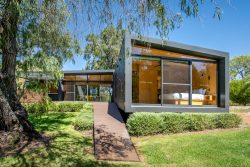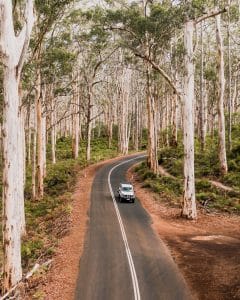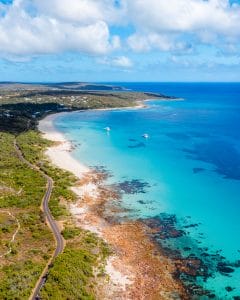Thursday, November 8, 2018
The secrets of the South-West’s bees and honey

Honey has had somewhat of a revival in recent years with people rediscovering the unique health benefits of nature’s golden liquid.
Antibacterial and a natural sugar option, the enzymes in honey have been lauded for helping with everything from digestion to hay fever, wounds and colds.
But far from settling on the mass-produced commercial honey available at the supermarket, consumers are increasingly turning to raw honey in the broader trend of farm-to-table produce.
From hobby beekeeping to honey producer
South-West beekeeper and owner of Nude Honey Co in Dunsborough, Myles Happ, said that’s exactly what drove him to start his business about three years ago after 10 years of hobby beekeeping.
A master potter by trade and part of the Happs Wines family, Mr Happ said the South-West is the ideal environment for making unique honey varieties.
“There’s all these amazing landscapes — different types of honey from different trees, different ecosystems — and it gives me a really good excuse to go out and explore,” he said.

Clocking up 50,000 km in the quest for honey
And explore he does. In his quest for the best honey varieties, Mr Happ said he had clocked up more than 50,000 km in his car just looking for the best places to position his hives.
As a migratory beekeeper, Mr Happ moves his 150 hives between the Karri, Jarrah and Wandoo forests of the region, often driving through the night and unloading hives in the morning in a new location, where they stay for four to six weeks.
“For me green pastures are flowering Eucalypt forests, because Australian Eucalypts are unique and make some of the possibly healthiest honeys in the world,” he said.
Nude Honey Co produces the following varieties of honey:
- Jarrah
- Whitegum
- Blackbutt
- Karri
- Wildflower Honey

South-West forests help make unique honey
Mr Happ said Jarrah is Western Australia’s most popular health honey but is notoriously fickle to produce, as is Karri because Karri trees flower every seven years at best.
Wildflower Honey, meanwhile, is the first extraction of the year in the middle of winter, with Mr Happ travelling north to the Pinnacles, Cervantes and Greenheads in search of Banksia and Grevillea.
“Essentially you’re tasting the distilled nectar of a particular part of Western Australia’s forest,” he said.

Beekeeping has a horticultural role, too!
Mr Happ is among a handful of commercial beekeepers in the South-West and said at a current maximum production capacity of 10 tonnes per year he is considered small.
However, his business also has an important role for the local horticultural industry, with 80 percent of his apiary being used throughout November to pollinate local avocado orchards. He also sells polystyrene beehives imported from Finland as well as queen bees, hives and colonies of bees.
Mr Happ said while some of the buzz about honey can be viewed as hype, he has chosen to take “a very wholesome approach” to the business to make honey that is minimally filtered with a fully traceable supply chain.
“Everyone can get an average backyard honey from Bicton, but these amazing varietal honeys, that’s where the work and the value is,” he said.
Nude Honey Co offers tastings from 11 a.m. to 5 p.m. daily from its Honey Gallery, which is housed in Happs Pottery on Caves Road, a short distance from Dunsborough.
If you’d like to visit Nude Honey Co on your next trip to the South-West, Private Properties has stunning holiday homes throughout the Margaret River region.
View our portfolio to discover the inspirational properties available.
Sign up for our newsletter to stay updated on all things Private Properties.







